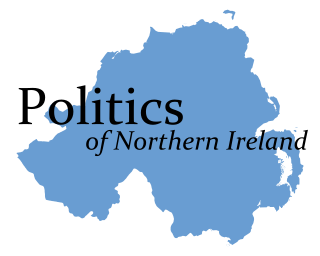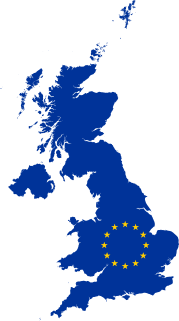| This article is part of a series within UK politics on the |
 |
|---|
This Wikipedia page is a list of government ministers in Northern Ireland.
| This article is part of a series within UK politics on the |
 |
|---|
This Wikipedia page is a list of government ministers in Northern Ireland.

The prime minister of Northern Ireland was the head of the Government of Northern Ireland between 1921 and 1972. No such office was provided for in the Government of Ireland Act 1920; however, the Lord Lieutenant of Ireland, as with governors-general in other Westminster Systems such as in Canada, chose to appoint someone to head the executive even though no such post existed in statute law. The office-holder assumed the title prime minister to draw parallels with the prime minister of the United Kingdom. On the advice of the new prime minister, the lord lieutenant then created the Department of the Prime Minister. The office of Prime Minister of Northern Ireland was suspended in 1972 and then abolished in 1973, along with the contemporary government, when direct rule of Northern Ireland was transferred to London.

The secretary of state for Northern Ireland, also referred to as the Northern Ireland secretary or SoSNI, is a secretary of state in the Government of the United Kingdom, with overall responsibility for the Northern Ireland Office. The incumbent is a member of the Cabinet of the United Kingdom, 17th in the ministerial ranking.

The Northern Ireland Assembly often referred to by the metonym Stormont, is the devolved legislature of Northern Ireland. It has power to legislate in a wide range of areas that are not explicitly reserved to the Parliament of the United Kingdom, and to appoint the Northern Ireland Executive. It sits at Parliament Buildings at Stormont in Belfast. The Assembly was in a period of suspension until January 2020, after it collapsed in January 2017 due to policy disagreements between its power-sharing leadership, particularly following the Renewable Heat Incentive scandal. In January 2020, the British and Irish governments agreed on a deal to restore devolved government in Northern Ireland.
The Northern Ireland Executive is the devolved government of Northern Ireland, an administrative branch of the legislature – the Northern Ireland Assembly. It is answerable to the assembly and was initially established according to the terms of the Northern Ireland Act 1998, which followed the Good Friday Agreement. The executive is referred to in the legislation as the Executive Committee of the assembly and is an example of consociationalist ("power-sharing") government.
The Sunningdale Agreement was an attempt to establish a power-sharing Northern Ireland Executive and a cross-border Council of Ireland. The agreement was signed at Sunningdale Park located in Sunningdale, Berkshire, on 9 December 1973. Unionist opposition, violence and general strike caused the collapse of the agreement in May 1974.
Northern Ireland is divided into 11 districts for local government purposes. In Northern Ireland, local councils do not carry out the same range of functions as those in the rest of the United Kingdom; for example they have no responsibility for education, road-building or housing. Their functions include planning, waste and recycling services, leisure and community services, building control and local economic and cultural development. The collection of rates is handled centrally by the Land and Property Services agency of the Northern Ireland Executive.

The government of Northern Ireland is, generally speaking, whatever political body exercises political authority over Northern Ireland. A number of separate systems of government exist or have existed in Northern Ireland.

The Northern Ireland Office is a UK Government department responsible for Northern Ireland affairs. The NIO is led by the Secretary of State for Northern Ireland and is based at Erskine House in Belfast City Centre and 1 Horse Guards Road in London.

The Executive Committee or the Executive Committee for Northern Ireland was the government of Northern Ireland created under the Government of Ireland Act 1920. Generally known as either the Cabinet or the Government, the executive committee existed from 1922 to 1972. It exercised executive authority formally vested in the British monarch in relation to devolved matters.

The Department of Education (DENI) is a devolved Northern Irish government department in the Northern Ireland Executive. The minister with overall responsibility for the department is the Minister of Education. The current Minister of Education is Michelle McIlveen as of 14 June 2021.

The St Andrews Agreement is an agreement between the British and Irish governments and Northern Ireland's political parties in relation to the devolution of power in the region. The agreement resulted from multi-party talks held in St Andrews in Fife, Scotland, from 11 to 13 October 2006, between the two governments and all the major parties in Northern Ireland, including the two largest, the Democratic Unionist Party (DUP) and Sinn Féin. It resulted in the restoration of the Northern Ireland Assembly, the formation of a new Northern Ireland Executive and a decision by Sinn Féin to support the Police Service of Northern Ireland, courts and rule of law.

The Northern Ireland Civil Service is the permanent bureaucracy of employees that supports the Northern Ireland Executive, the devolved government of Northern Ireland.

The Northern Ireland Assembly was a legislative assembly set up by the Government of the United Kingdom on 3 May 1973 to restore devolved government to Northern Ireland with the power-sharing Northern Ireland Executive made up of unionists and nationalists. It was abolished by the Northern Ireland Act 1974.

The Executive Office is a devolved Northern Ireland government department in the Northern Ireland Executive with overall responsibility for the running of the Executive. The Ministers with overall responsibility for the department are the First Minister and deputy First Minister.

The First Minister and deputy First Minister of Northern Ireland are the joint heads of government of the Northern Ireland Executive and have overall responsibility for the running of the Executive Office.

The Office of the Northern Ireland Executive in Brussels is part of the Executive Office and is the focus of Northern Ireland's relations with the institutions of the European Union.

The COVID-19 pandemic reached Northern Ireland in February 2020. The Department of Health reports 3,274 deaths overall among people who had recently tested positive. The Northern Ireland Statistics and Research Agency reports 4,371 where the death certificate mentioned COVID as one possible cause. Northern Ireland has the lowest COVID death rate per population in the United Kingdom. The vast majority of deaths have been among those over the age of 60 and almost half were in care homes.
The following is a timeline of the COVID-19 pandemic in Northern Ireland during 2020. There are significant differences in the legislation and the reporting between the countries of the UK: England, Scotland, Northern Ireland, and Wales.
The following is a timeline of the COVID-19 pandemic in Northern Ireland during 2021. There are significant differences in the legislation and the reporting between the countries of the UK: England, Scotland, Northern Ireland, and Wales.